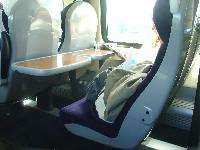Travel time of rail passengers is increasingly well spent

What do rail travellers do with their time on the move? How worthwhile do they consider this time to be? How do they equip themselves for using their time and do they plan in advance how to get the most out of their travel time?
These are questions that the University of the West of England's Centre for Transport and Society (CTS) has explored through a national survey of over 20,000 rail passengers comparing the answers with the results from a similar study six years ago. The findings provide a unique insight into the experience of rail travel in Britain and how this is evolving in the face of rapid developments in information and communication technologies (ICTs).
The results reveal that reading for leisure, window gazing and working/studying are still the most favoured travel time activities. Over the six year period between the two studies the availability and use of mobile technologies has increased – in some cases very substantially. In 2010 passengers were 63% more likely to be texting or phoning for personal reasons and 83% more likely to be doing so for work compared to 2004. One in five commuters and one in three business travellers in 2010 were checking e-mails and one in 20 passengers were accessing social networking sites. Listening to music has around doubled in six years in its incidence suggesting an increasing capacity for travellers to personalise the public space of the railway carriage.
There has been a sharp upward trend in the proportion of travellers who have and use a laptop computer on the train. The same is true for MP3 players. Meanwhile the fortunes for the humble newspaper as a travel accompaniment appear to have changed. In 2004 the majority (79%) had a newspaper to hand – by 2010 this had reduced to a minority (45%). However, those who still have a newspaper to hand are around twice as likely to use it compared to the position in 2004.
Most notably the analysis reveals a substantial increase in identification of 'positive utility' of rail travel time – the proportion of travellers overall making very worthwhile use of their time has gone up by a quarter to 30% of all passengers; meanwhile compared to 2004 there has been a 37% reduction in the proportion of business travellers indicating their time on the train was wasted (down from 13% to 8% of business travellers).
Individuals who planned in advance how to use their time on the train are three times more likely to consider their time use very worthwhile compared to those who had not planned at all and seven times less likely to consider their time has been wasted.
Professor Glenn Lyons, who has been leading the research, believes more attention must be given to the meaning of travel time and its use. “In economic appraisal used to assess the merits of investment in transport schemes, such as high speed rail, it is assumed that time spent travelling is of itself economically unproductive and in turn that being able to save time by making journeys quicker and more reliable produces benefits that have monetary value.
“Getting from A to B as quickly as possible may seem a sensible goal and yet a growing body of research is exploring the positive value of travel time itself.
“Travel for most people is integral to their daily lives – we are short sighted if we simply consider it a means to an end. It is an end in itself and one which is adapting to and supported by the information age.
“Our decisions on high speed rail will have consequences for decades to come. Those consequences are not simply a result of quicker journeys saving time. They will be shaped by how we experience and value our time on the move and how this affects our choices on where to live and work and our means of travel. This research has a serious contribution to make to debate on the future investment in our transport system.”
Previous research by CTS alongside colleagues at Lancaster University has revealed the importance of travel time as gift to oneself, providing: transition time – a need for experiencing distance and the opportunity for gearing up to the destination's demands; time out – escape from life's obligations offering 'backstage' time to be oneself and engage in specific activities such as reading or listening to music; and time for – a transitory space in which to fulfil obligations such as work. Such research also underlined the distinction between clock time and experienced time – with the latter being able to stretch or compress.
More information: www.transport.uwe.ac.uk/resear … el-time-use-2010.asp
Provided by University of the West of England















